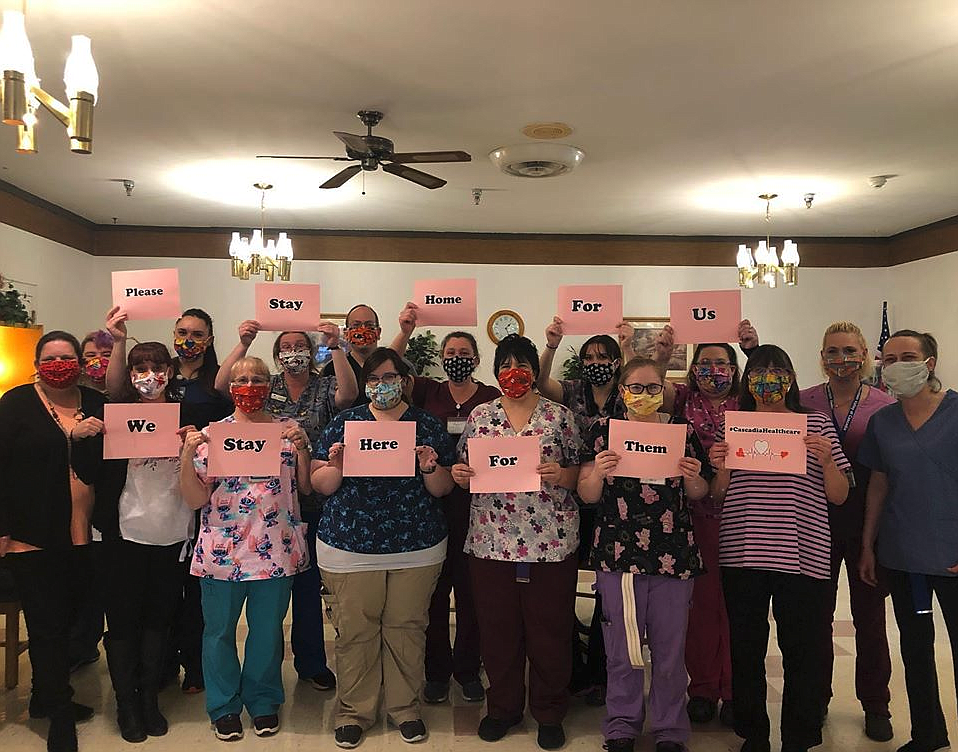Protecting those most at risk
By CHANSE WATSON,
Managing Editor and
JOSH McDONALD,
Staff Reporter
KELLOGG — Whether it be luck, proper social distancing, a lack of testing or a combination of all three — Shoshone County (along with Boundary and Benewah) still has zero confirmed cases of COVID-19.
This streak is all the more impressive considering that cases in neighboring Kootenai and Bonner counties continue to rise. As of Tuesday, Panhandle Health District reports that the total number of cases in the five northern counties is at 37, with 36 coming from Kootenai.
While it is likely that there is someone locally with the virus that simply hasn’t been tested (or is waiting on results), Dr. David Lawhorn and the rest of the staff at Shoshone Medical Center continue to prepare for that moment when a case is confirmed.
“We are in a critical waiting period and strongly encourage everyone to stay home and limit exposure,” Dr. Lawhorn said. “The largest concern and focus is protecting our local older population and nursing home residents.”
Local nursing homes have taken steps to limit their residents’ contact with the outside world, but it doesn’t hurt to play your part as well to limit exposure.
According to a JAMA Health Forum article by Michael L. Barnett, MD, MS, and David C. Grabowski, Ph.D., nursing homes have become “ground zero” in the COVID-19 pandemic.
“Of the first 46 confirmed deaths attributable to COVID-19 in Washington by mid-March 2020, 30 deaths, more than 1 in 4 residents of the facility, were associated with Life Care Center of Kirkland,” the article stated.
“More reports are emerging of outbreaks in nursing homes across the U.S. and it is likely that other nursing homes around the country will also become hubs in their communities for the worst clinical manifestations of COVID-19.”
In Kellogg, at Mountain Valley of Cascadia, CEO Emilee Kulin has her facility working not only within the tight restrictions of a high functioning, skilled nursing center, but also with even more restrictive, self-imposed guidelines to ensure that their patients are getting high level care.
“We are restricting visitors, screening staff, monitoring everything,” Kulin said. “Infection control is at the forefront for any health care provider, and Cascadia has employed rigorous infection control protocols since its inception.”
In a very detailed release from its corporate office, Cascadia’s director of human resources William Paven outlined where the company is getting its guidance from, as well as providing a list of some of the specific steps that they are taking to make sure that their facilities stay as safe as possible.
“We are carefully following the recommendations of the Centers for Disease Control (CDC) and adhering to the guidance offered by the Centers for Medicare and Medicaid Services (CMS),” Paven said. “Most importantly, our staff of medical professionals who are on the ground, in our communities, are working around the clock vigilantly utilizing every tool available to them to care for our residents.”
Some of the steps the company is adding to their regiments are simple in theory and echo Kulin’s statements, while others will take some adjustments:
- Limiting exposure by temporarily prohibiting outside visitors into our communities.
- Monitoring residents’ health to detect potential health issues before they become a problem.
- Utilizing telemedicine so health care professionals can engage one-on-one with our residents.
- Limiting travel of our employees and health screening them prior to work.
- Taking this very seriously and exercising an abundance of caution.
- Conducting COVID-19-specific training for our caregivers and medical professionals.
- Keeping current on the frequent updates from the CDC and CMS.
The facility in Kellogg has always been at the forefront of technology, which should make tele-communication with patients’ family, friends, and doctors much easier for them to adjust too.
“Quality of life is tied not only to medical care but also to emotional and social care,” Kulin said. “To shield our residents against social isolation, Cascadia is engaging various means of technology so that our residents can visit with their friends and family through Skype, Zoom, Facetime, and any other methods to which families and loved ones have access.”

